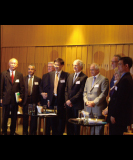You are browsing > Service in Taiwan > Development
Better but not good enough: New approaches are needed to make globalisation work for all, OECD says in latest Economic OutlookOECD
Watch the presentation of the Economic Outlook
The global economy is expected to pick up moderately but greater efforts are needed to ensure that the benefits from growth and globalisation are more widely shared, according to the OECD’s latest Economic Outlook.
“After five years of weak growth, there are signs of improvement,” OECD Secretary-General Angel Gurría said launching the Outlook during the Organisation’s annual Ministerial Council Meeting and Forum in Paris. “The modest cyclical expansion underway will not, however, be sufficient to sustain strong gains in standards of living across OECD countries. Deeper, sustained and collective commitment to coherent policy packages that support inclusiveness and productivity growth are urgently needed. We need a more inclusive, rules-based globalisation that works for all, centred on people’s well-being” Mr Gurría said. [Read full transcript]
Stronger business and consumer confidence, rising industrial production and recovering employment and trade flows will all contribute to an improvement in global GDP growth from 3.0% in 2016 to 3.6% in 2018, according to the Outlook.
Among the major advanced economies, the recovery will continue in the United States, which is projected to grow by 2.1% in 2017 and 2.4% in 2018. The euro area will see steady growth at 1.8% in 2017 and 2018. In Japan, growth is projected at 1.4% in 2017 and 1% in 2018. The 35-country OECD area is projected to grow by 2.1% in both 2017 and 2018, according to the Outlook.
In China, growth is expected to slow to 6.6% in 2017 and 6.4% in 2018, while India’s growth rates are expected to strengthen to 7.3% this year and 7.7% in 2018. Growth in Brazil is expected to turn positive for 2017 before reaching 1.6% in 2018.
While the Outlook welcomes the pick-up in the global economy, it points out that the forecasts still leave growth rates below both past norms, as well as the pace needed to escape fully from the low-growth trap. It also draws attention to the fact that while some factors could push global growth higher than projected, there are also significant downside risks.
On the positive side, the Outlook points to the ageing capital stock of firms that may spur stronger-than-expected replacement investment in higher quality capital with more advanced technology. This would improve cyclical conditions and support a revival of investment-intensive global value chains, with knock-on benefits to domestic demand. Higher quality capital would also improve productivity and boost potential output.
Among downside risks, the Outlook points to financial risks and vulnerabilities in advanced and emerging economies, high policy uncertainty in many countries and continued weak wage growth.
“Policymakers cannot be complacent” said OECD Chief Economist Catherine L Mann. ”Better choices on fiscal, structural and international policies will improve the well-being of a country’s own citizens, but also spill over to improve the outcome for others, raising the probability that the current cyclical upturn will endure and become the foundation for sustained and broad-based improvements in living standards around the world.”
A special chapter in the Outlook shows that deeper trade integration through global value chains has increased productivity and raised well-being. But it has also led to job losses, particularly for some manufacturing workers, accentuating pressures from technological and demand changes. With manufacturing activities regionally concentrated, this has resulted in some regions falling behind.
The Outlook suggests that an integrated approach is needed to make globalisation work for all. This must include domestic policies to encourage opportunity, innovation and the creation of new firms, so as to yield economic growth that is both stronger than in the recent past and also more inclusive. At the same time, more effective targeted policies are needed to support people and regions that risk getting left behind. Last but not least, countries must work together to fill gaps in the governance of the international economy. This will ensure a more level playing field, as well as more robust and implementable international standards across a range of areas including labour markets, the environment, corporate responsibility, governance and taxation.
For more information on the Global Economic Outlook, see: www.oecd.org/economy/economicoutlook.htm
Read the full version online: www.keepeek.com/Digital-Asset-Management/oecd/economics/oecd-economic-outlook-volume-2017-issue-1_eco_outlook-v2017-1-en









